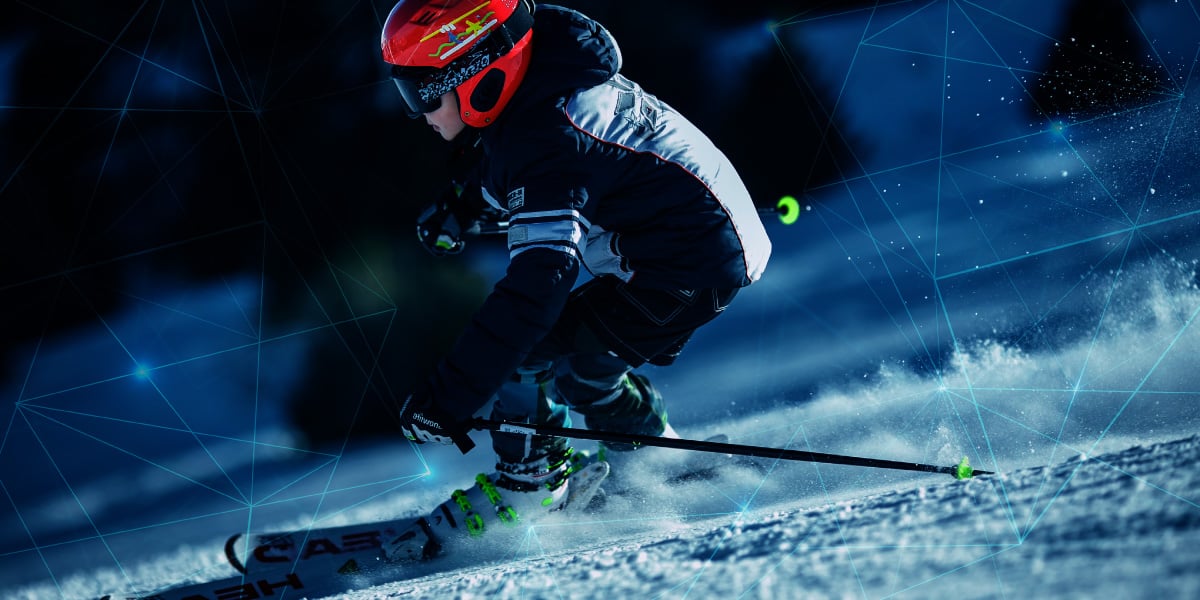Discover 7 technologies of the Beijing Winter Olympics
 Zoox Smart Data - 24 de February de 2022.
Zoox Smart Data - 24 de February de 2022.
The 2022 Winter Olympics promised and brought technological innovations that seem to be part of a futuristic science fiction movie scenario.
From the expected 5G internet to robots that reduce contact between athletes and staff, the largest sporting event on ice and snow has transformed Beijing, China, into a show of high-tech innovations that promise to definitively transform life in the city after the games.
In this article you will learn about and update yourself on these trends - which are already a reality in the Orient.
- Handyman Robots
- Security 'Bubble'
- Artificial Snow
- Smart Beds
- Ultra high Definition
- 5G Everywhere
- Chinese Digital Currency
Now get to know more about these 7 technologies that will benefit winter sports athletes and the public, from Beijing 2022 onwards.
1. Handyman Robots
Hundreds of robotic assistants have formed an army in the Olympic Village with one main goal: to prevent contact between athletes and local Winter Games staff.
The tasks of these obedient 'employees' are as diverse as possible: they range from delivery to acting as hand sanitizers. In addition, they are able to assist in the kitchen by flipping burgers, collecting garbage, and helping with medical care for athletes.
More than 100 of them serve food for 24 hours in canteens, while others 'sweep' the air in search of the Covid-19 virus, destroying any particles of the disease.
2. Security 'Bubble'
In addition to the robots, a system for detecting Covid-19 particles in space was also purchased by the Organizing Committee, and developed by a team of Chinese scientists.
The system features aerosols with nano-filtration technology that not only alerts those in the environment in case of detection of coronavirus particles, but also sanitizes water and cooling vents.
In this way, the International Olympic Committee is able to ensure that the Beijing winter games have sufficient health security to not start a new wave of the disease.
The other bubble involves everyone inside the Olympic Village and any area surrounding the event, such as the press, broadcast technicians, athletes, and spectators. Everyone, without exception, needs to download an app called My 2022, which is designed to protect everyone during the event.
The app is able to track all health data, such as vaccine information and results of all daily Covid-19 tests. Permission to leave a room and move around is given upon request in the app 24 hours before the passes are scanned.
3. Artificial Snow
Yes, sometimes snow is lacking and ends up being one of the main concerns of the Organizing Committee. The Yanqing and Zhangjiakou districts usually have about 20cm of snow per year. This means that for the games, more than 180,000 m³ of water would be missing.
This missing quantity is artificially acquired by the International Olympic Committee. The authorities in the Forbidden City have transferred a large amount of snow to prevent the levels of frozen water underground from decreasing and hindering the maintenance of snow.
In addition, the systems have the ability to produce snow under high pressure, which is triggered automatically if the ambient temperature rises.
4. Smart Beds
All beds in the Olympic Village are equipped with mattresses with a viscoelastic foam that can monitor the athletes' heart and respiratory rate. They issue reports with the vital signs of the potential gold, silver or bronze medalists and can even send them directly to the responsible coaches and technical staff.
5. Ultra high Definition
The transmission of these games is about details. Many details. The investment in telecommunications allows the transmission of the games, starting in 2022, to happen in Ultra high definition, that is: 4K and 8K.
The Organizing Committee has also invested in Virtual Reality and Augmented Reality infrastructures during the games to transform the spectators' experience once and for all.
6. 5G Everywhere
Extremely fast, high-quality internet access could not be missed. With many interviews and contacts with athletes and coaching staff done via online video, China invested in a camera system with remote management and a powerful cloud storage for the interviews. All of this is designed to protect athletes from Covid-19.
5G technology is the framework to support all communication surrounding the event. The high speed minibuses that circulate inside the Olympic Village are driven remotely by a driver through this connection and with a wave, the system already understands that there is a need to make a stop.
In addition, passengers can press virtual buttons inside the bus to buy food, drinks, and event souvenirs.
7. Chinese Digital Currency

All Beijing visitors can now experience what China is calling the digital yuan or eRMB.
The games are a large scale test event of the use of the currency - that was created with support from the Popular Bank of China. By using it, Chinese authorities are able to track the movement of money around the country.
Payment inside the Olympic Village can be made with physical Visa cards, cash, and the digital currency at e-wallets and digital wristbands via WeChat, JD.com and Alipay.
Follow the Zoox blog and stay on top of the latest trends in technology, management, innovation and digital transformation.






Comments